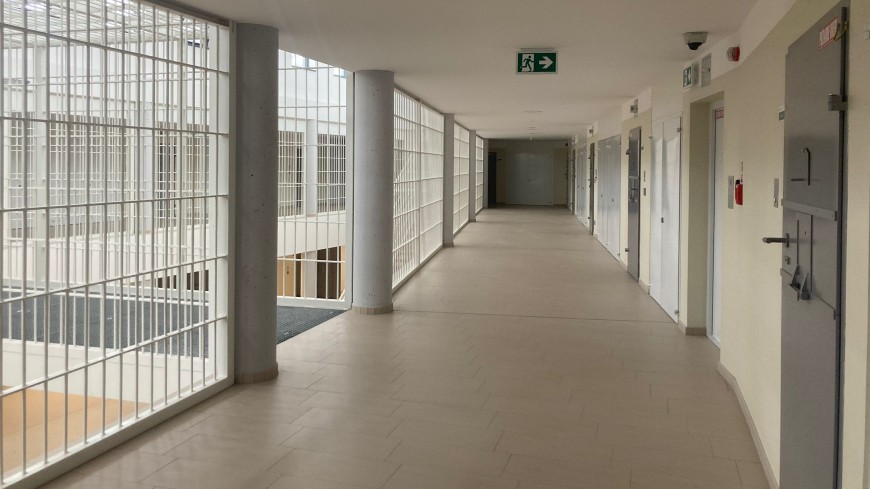During the visit, the CPT delegation focused on the treatment of persons held in police custody, in several prisons, and at Medveďov Immigration Detention Facility. It also assessed the situation of persons held at Hronovce Detention Institute and of involuntary patients in two civil psychiatric facilities.
The majority of persons interviewed during the visit stated that they were treated correctly by police officers. However, the delegation did receive some allegations of physical ill-treatment and excessive use of force during apprehension, during the transfer of detained persons to police stations and during their initial registration by police officers.
Despite the fact that there had been a slight decrease in the prison population since the previous CPT visit in 2018, and that the prison system as a whole was operating below its official capacity, cramped conditions were observed in some cells and the prison population rate remains amongst the highest in Europe.
At Žilina Prison, no allegations of physical ill-treatment of prisoners by staff were received, while at Hrnčiarovce nad Parnou Prison, a few allegations of physical ill-treatment (such as slaps and kicks) were made by the prisoners interviewed. In contrast, a number of prisoners interviewed at Ružomberok Prison made allegations of physical ill‑treatment by certain prison officers, including slaps, punches, kicks and blows with telescopic batons. Prison officers in this establishment should be given the firm message that any form of ill-treatment of prisoners is unacceptable.
The CPT gained a positive impression overall of the regime activities provided to the majority of sentenced prisoners held in the three establishments visited, and noted the efforts to provide out-of-cell time to remand prisoners held under the mitigated regime. However, in particular remand prisoners held under the standard regime were locked in their cells for up to 23 hours per day. The Slovak authorities should significantly increase the out-of-cell time for remand prisoners and pursue their efforts to engage more prisoners in work and organised activities.
At Medveďov Immigration Detention Facility, the CPT delegation received a few allegations of physical ill-treatment of detained foreign nationals by staff, consisting of punches, which were reportedly inflicted to enforce obedience.
The facility was of a carceral appearance and the building used for accommodating foreign nationals was in a poor state of repair. Regrettably, no activities were in place at the facility at the time of the visit.
Patients interviewed at Hronovce Detention Institute made no allegations of physical ill‑treatment by staff. The buildings were clean, offering good access to natural and artificial light. Nevertheless, steps are needed to create a more therapeutic environment, including by providing patients with visual stimulation in their rooms and communal areas. Further, the Committee is critical of the excessive focus on security, with an abundance of CCTV cameras, including in all patients’ rooms. The CPT considers that the decision to impose CCTV surveillance in a patient’s room should always be based on the existence of serious health or security concerns, established through an individual risk assessment, and reviewed on a regular basis.
The approach of conducting all consultations and activities through bars in one of the treatment units should also be reconsidered.
Patients interviewed by the delegation at the psychiatric departments of Rožňava Hospital and of Bratislava University Hospital – Hospital of Saints Cyril and Methodius made no allegations of ill-treatment by staff. Patients’ living conditions were satisfactory in both establishments visited.
Patients were offered proper treatment but they were not involved in the drawing up of their own treatment plans, which also lacked an individualised and multidisciplinary approach.
Concerning electro-convulsive therapy (ECT), it is positive that the Slovak authorities adopted national guidelines on ECT in 2020 imposing dedicated registers for its use in all psychiatric establishments.
However, the Committee found that at Rožňava psychiatric department, recourse to ECT was frequent, and not always applied in conformity with the applicable national guidelines.
Further, seven net-beds were in use there at the time of the visit, which the Slovak authorities should ensure are withdrawn from service, in line with the new statutory framework on the use of means of restraint.
In their response, the Slovak authorities provide information on the measures taken in reaction to the CPT recommendations. In particular, they submit detailed information on guidance and training provided to police officers to prevent ill-treatment, and they provide further information on planned legislative amendments concerning sentenced prisoners. They also state that they are trying to improve material conditions at Hronovce Detention Institute and have adjusted the use of CCTV cameras in this establishment. As regards civil psychiatric establishments, the Ministry of Health intended to carry out a clinical audit of the use of ECT and confirmed that
net-beds would be phased out in psychiatric facilities.
The CPT report and the response of the authorities have been made public at the request of the Slovak authorities.




